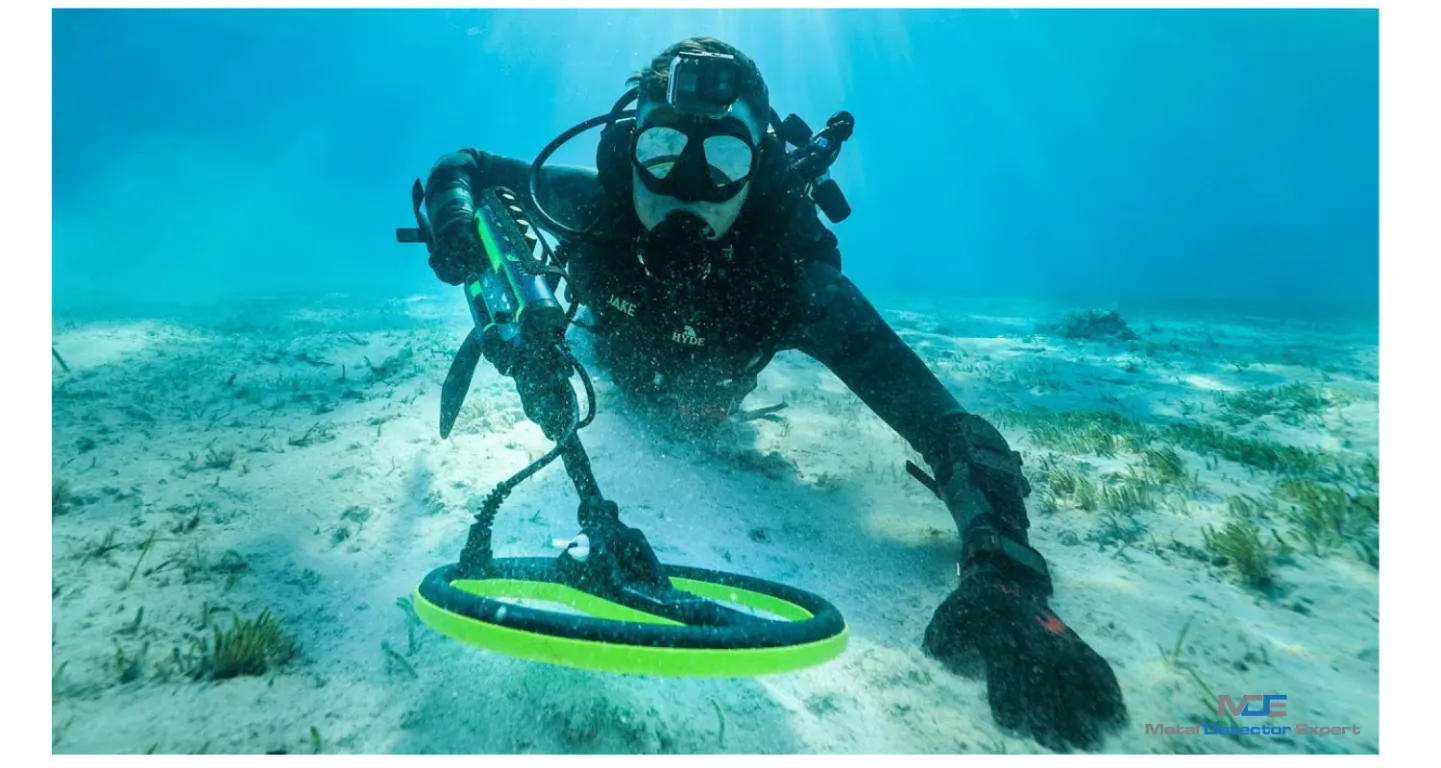Can You Get Waterproof Metal Detectors?
If you are looking to do a hunt underwater for some gold or other nuggets, you will need to ensure your using a waterproof detector for the job, but not all metal detectors are waterproof.
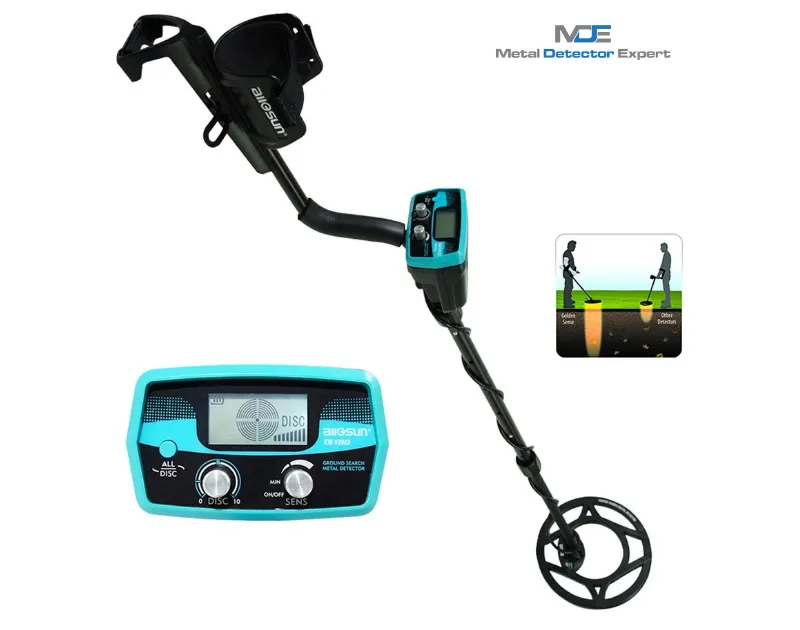
To search properly underwater without the risk of damaging your metal detector you need an underwater metal detector with a waterproof coil, the average land metal detector is not waterproof and can get damaged.
Down below we’ve put together an extensive informational guide that will discuss why you should buy an underwater metal detector, what to consider in your model, where to use and how to find the best model, how to fix a damaged metal detector as well as some tips for using one underwater.
So without further ado, let’s dive right in!
Why You Should Buy a Waterproof Metal Detector
Investing in an underwater metal detector opens up a whole new do for finding relics and other items in the water you are likely to find more unusual relics or unique stones and gems which have been washed aside off land.
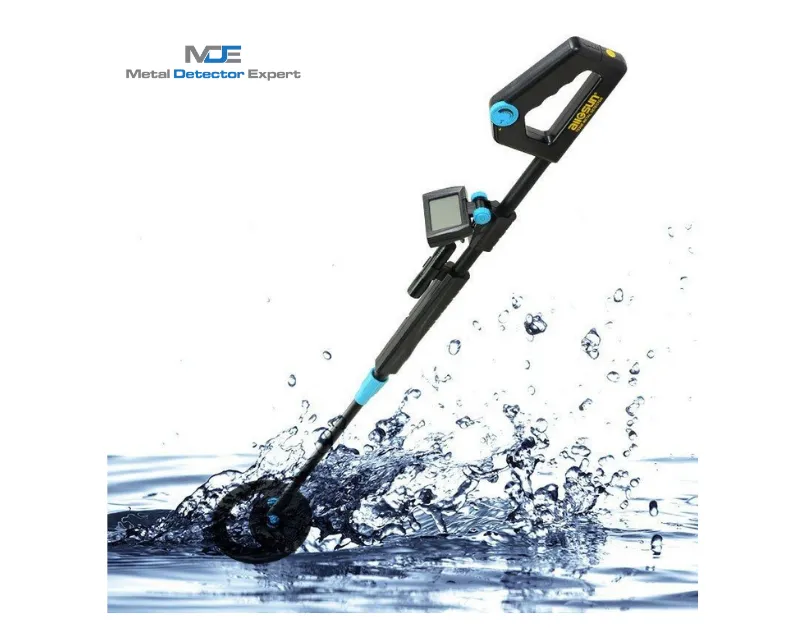
Beach hunting in particular is one of the best hunts you can do with a waterproof metal detector to find hidden treasure underwater since most people pass here and drop items, with a waterproof coil on your detector, you don’t have to worry about the depth of where your detecting either.
Things To Consider Before Buying a Waterproof Metal Detector
If you do decide that a waterproof metal detector is worth it, then there are a few important pieces of advice we suggest considering before looking at buying waterproof detectors.
Consider The Types Of Water Detecting You Want To Do
It’s good to note that while there are waterproof metal detectors out there, they are waterproof to varying degrees depending on the type of detector that you buy.
- Weatherproof metal detectors – Weatherproof metal detectors are the type of detector which use a waterproof coil but the body itself is not waterproof, this means they can only be used in shallow water not deep.
- Shallow metal detectors – Shallow water metal detectors often have a waterproof coil plus a waterproof control box, this means they can be used at great depths, but still only shallow water.
- Fully submergible metal detectors – These types of metal detectors are underwater detectors that can be used for diving and are fine to search at great depths, most of these models will have a rating as to how deep they can go.
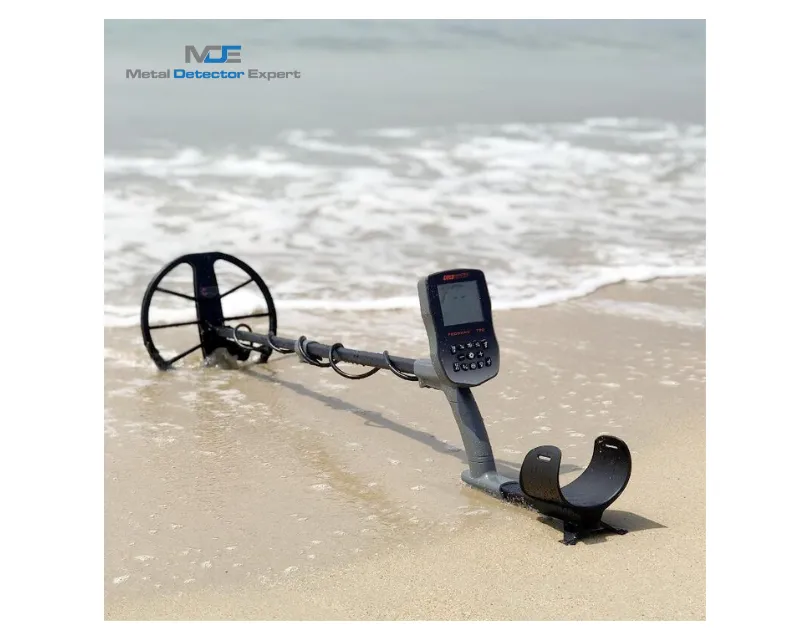
Very Low Frequency (VLF) Vs Pulse Induction
Apart from the waterproof design of your metal detector, you should also consider the type of detector you want for searching, the main two types to pick from are pulse induction metal detectors or VLF types.
Very Low-Frequency Metal Detectors
These VLF metal detectors operate with a 3 to 30 kHz frequency range and are best for getting rid of junk items while looking for desirable items. If you want to search for coins these detectors are best but they do not perform well in areas with high ground mineralization so are not the great choice for saltwater hunting.
For better settings, these metal detectors often have manual ground balance too and sensitivity settings which make searching in difficult freshwater conditions easier.
Pulse Induction Metal Detectors
Pulse induction metal detectors are the best choice if you want to do beach water hunting since they are not affected by the mineralisation in water.
For beach water hunting these detectors have a high sensitivity to precious metals but are not so good at discrimination settings so you will pick up a lot of trash while hunting too.
Where You Should Use a Waterproof Metal Detector
As we touched on above, the kind of waterproof metal detector you choose should also relate to where you want to be able to use the device.
There are many places you can try hunting for treasures which we will list below.
- River creeks or streams.
- The sea.
- Shallow river banks.
- Full water diving.
- Marshes.

How To Find The Best Waterproof Metal Detectors
Looking for the best type of waterproof metal detector is not the easiest of the tasks, the market is saturated with all sorts of detectors varying in their features, so to make the search more simple, we’ve listed the top specs to watch out for in your detector below.
- Water depth – For detector electronics in particular it’s essential to make sure your choice of detector is suitable for taking into the water at the depth you need, this will usually be stated on the features with most waterproof models being able to go at least 200 feet without any troubles detecting.
- PI or VLF – As we touched on above, when choosing a detector electronics you will have the choice of either pulse induction or VLF, we suggest PI is the better choice for saltwater hunting but not as good for discrimination. For diving, you would need a PI model due to ground minerals in the sand.
- LCD Display – An LCD can be useful on your detector electronics to show modes chosen and another setting, it is important if your detector comes with one that is fully waterproof, not just weatherproof.
- Discrimination modes – Depending on what you are looking for some of the best metal detectors will have discrimination modes, these modes allow you to filter out other items and zone in on the types of metals you are looking for, some of these modes could be; all-metal mode, coin mode or jewellery mode for example. PI detectors often have more limited settings.
- Coil size – One of the most important specs to look for in your waterproof detector electronics is the waterproof coil size. The bigger the coil size then the deeper your detector can go but the more junk targets it can pick up, the smaller your coil size then the more sensitive your detector electronics will be.
- The brand – Although not the most important spec of a detector, going for a trusted brand can ensure that your get a high-quality model, some to name are Fisher, Garette sea hunter or Nokta.
- Audio features – It’s useful if beach detectors and water detectors have audio sound for helping you detect and pinpoint objects, these alarms should be noticeable more than land detectors and will often need to be paired with waterproof headphones.
- Design – A detector for beaches or shallow water hunting should have a sturdy anti-rust material and an extendable arm to allow you to hunt at different depths.
- Saltwater usage – If you planning to hunt in saltwater’s territory then your detector should be able to do this, if not you could potentially damage the detector.
- Battery backup – For people who plan to detect for long periods having detector electronics with a backup battery is a smart idea.
- Accessories – Make sure plenty of accessories are included with your metal detectors such as waterproof headphones, probes, a carry case and even a trowel for digging up treasures, you may need to purchase a few of these separately, however.
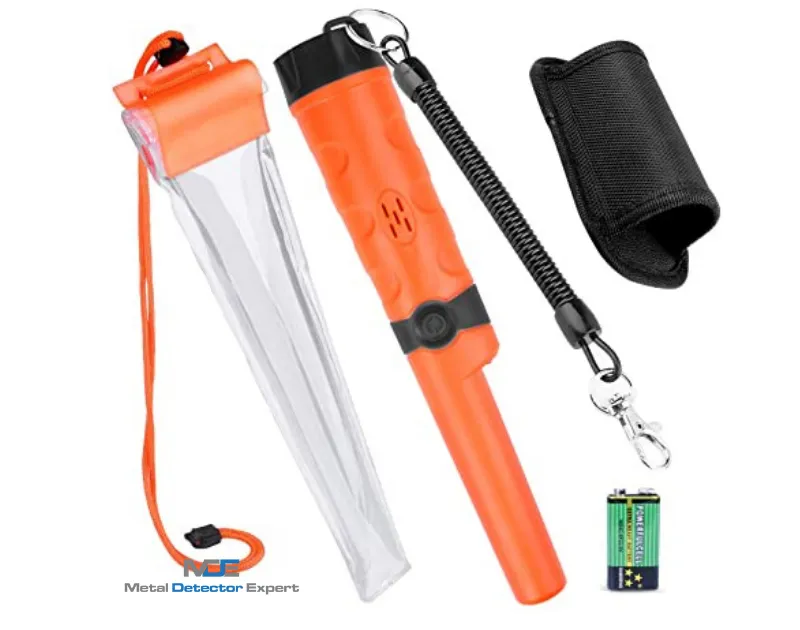
What To Do If Your Metal Detector Gets Wet
If your using a metal detector in the rain or it accidentally gets wet don’t panic, we’ve got you covered with some steps to try and recover your device below.
- Step one – Straight away turn off your device if you suspect water damage and remove the control box, take a hairdryer and try to dry out some of the water from the control box, be careful not to heat the device too much.
- Step two – Leave the control box out in the air to dry, at this stage you could also put it in rice which can help to absorb any moisture inside of the device.
- Step three – Reinsert your battery once dried out and try to see if the device turns on, if not your will have to consider replacing the detector.
Tips For Using a Detector In The Rain
It’s not easy to protect your detector electronics from unexpected rain so to keep your device in perfect condition, try following these precaution tips below.
- Keep an eye out for unexpected readings – Any unexpected bleeping or false readings can indicate the normal metal detector might have been water damaged, in this case, you should turn the device off straight away.
- Use a waterproof coil – Having an optional waterproof coil is a must-have for your detector when it starts to rain or just hunting ground becomes marsh-like.
- Have a cover – Keeping your detectors carry case with you is important for these wet extreme conditions and can save you from damaging any basic equipment.
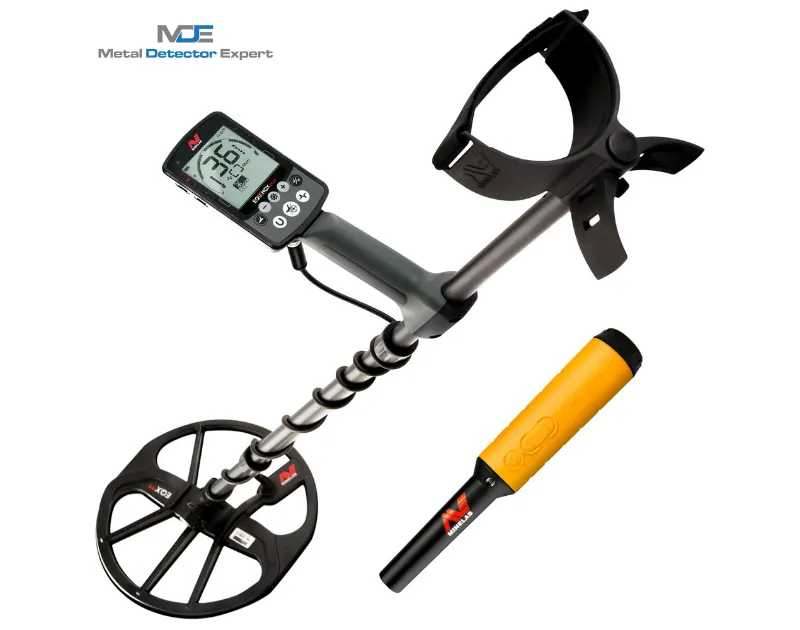
Are Cheap Waterproof Metal Detectors Any Good?
If you’ve been looking on the market for a waterproof metal detector you might have come across some pretty cheap options.
Cheap waterproof metal detectors perform great for basic metal hunting, they do however have a lack of adjustment settings and discrimination settings so are not best for hunting in difficult conditions, this could make them easier to use on the plus side.
We would not suggest using very cheap waterproof metal detectors at a great depth as diving models due to their lack of durable design.
Our Best Underwater Metal Detecting Tips & Tricks!
If you’ve finally found the right underwater metal detector for diving or freshwater hunting then it’s time to put it to the test, underwater metal detecting can be a little different to land hunting, however, so we’ve listed our top tips and tricks to help you below.
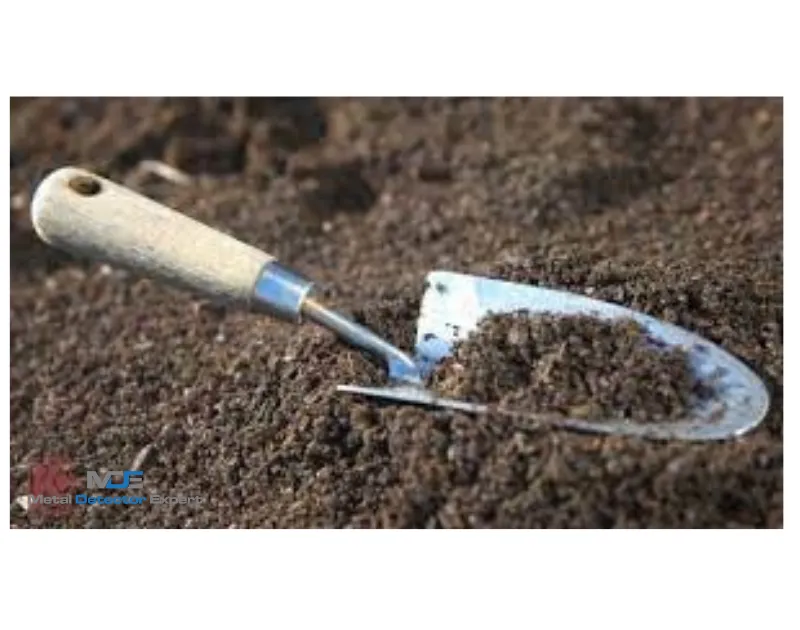
- Target right – Look for the best spots to dive or shallow water hunt in, these should ideally be areas that get populated so as you have more chances of finding items, for example, a beach or piers and docks where people are often.
- Get your settings right – Before you even start detecting you need to make sure that you get all your settings right. For example, start with a high discrimination setting if the area you are hunting in is trashy and go through the elimination mode, consider the sensitivity and frequency too as a detector for diving needs to be focused on what it’s looking for.
- Consider a wet suit and boots – Many people bring accessories such as metal detector headphones but forget important accessories such as a wetsuit for diving and boots for hunting in river beds, normal footwear can be dangerous if you get cut up on rocks for example.
- Tether your detector to you – To go the extra mile and keep your equipment safe you could always tether the detector and pinpointer to you when water searching, this ensures nothing gets lost in the hunting ground.
- Pick the right trowel – Some additional items to take with you when doing your hobby of metal detecting are a decent trowel, this can help you to dig up treasure from the sand with ease.
- Get the right time – An array of equipment can make metal detector hunting easier but one thing which is important when underwater hunting is the time, for example, if you are detecting in the sea consider the tide time, for divers you need to look out for the current too.
- Daytime hunt only – Finding larger items and treasures in the water is much easier during the daylight, night detecting the water is not an easy job, even with a high-level model.
Frequently Asked Questions About Waterproof Metal Detectors
Are frequency VLF models or pulse induction models better for underwater use?
Pulse induction detectors are the better choice for metal detecting since they are not affected by ground minerals like VLF models are, they are however a little more expensive and do not have as many operating modes, but are still the better choice for saltwater.
What are some popular diving metal detectors?
A few popular waterproof detectors to name are the Garrett Ace 250, Garrett Sea Hunter, Garrett ATX and Fisher models.
Where should I hunt with my waterproof metal detector?
Hunting at a popular beach is a good idea due to the increased likelihood of finding items. River beds and docks are also excellent starting points.
What kind of treasure products can you find in water?
You could find any treasure underwater the same as on land, this could be lost coins, jewellery and other kinds of relics.
Should my detector have pinpoint mode?
The pinpoint mode can be useful in a detector but it does not replace a regular pin pointer which is crucial to zoning in on a target, the one inside a detector is often less accurate.
What is a multi-frequency metal detector?
These are more of a multi-purpose detector and operate with multiple frequencies to help you zone in on specific targets, they tend to be more expensive.
How do pulse induction detectors work?
Pulse induction metal detectors work by using a signal through a copper coil to create an electromagnetic field, this signal of electricity can then recognise and zone in on other signals within the ground.
What categories of metal detectors are there?
There are different waterproof metal detectors such as weatherproof, semi-waterproof and diving metal detectors, these all have varying degrees of waterproofing.
Can I use a waterproof detector on land?
Yes, there’s no reason as to why you can’t use a waterproof detector and off the land as a detector pro it will still pick up hidden treasures.
Last Words
Overall, metal detectors are not all waterproof, some have varying degrees of waterproofing such as a waterproof coil but still cannot be fully submerged underwater. Depending on what you want to do with your detector you should buy the appropriate type, we would suggest using pulse induction detectors if you want to avoid minerals in the ground interfering with your readings.
